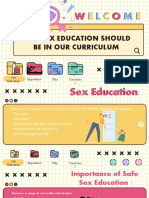Sex Education: Understanding Health,
Relationships, and Respect
Introduction
Sex education is the instruction on topics related to human sexuality, including anatomy,
reproduction, consent, sexual orientation, gender identity, contraception, sexually transmitted
infections (STIs), and healthy relationships. It aims to equip individuals with knowledge,
attitudes, and skills to make informed decisions about their bodies and relationships.
1. Human Anatomy and Reproduction
Key Topics:
Male and female reproductive systems
Puberty and physical development
Menstruation and sperm production
Fertilization and conception
Pregnancy and childbirth
Why It Matters:
Understanding one’s body helps young people identify normal development and recognize when
to seek help for medical concerns.
2. Consent and Personal Boundaries
Key Topics:
What is consent?
Saying no and respecting others' boundaries
Recognizing coercion and abuse
Legal age of consent
Why It Matters:
Consent is fundamental to any healthy relationship. Everyone has the right to feel safe and
respected.
�3. Relationships and Communication
Key Topics:
Types of relationships (friendships, romantic, familial)
Respect and communication
Recognizing unhealthy or abusive relationships
Breakups and emotional wellbeing
Why It Matters:
Strong communication and respect are at the heart of healthy relationships.
4. Gender Identity and Sexual Orientation
Key Topics:
Gender vs. sex
Gender identity (e.g., cisgender, transgender, nonbinary)
Sexual orientation (e.g., heterosexual, homosexual, bisexual, asexual)
Respect and inclusion
Why It Matters:
Education fosters understanding and reduces discrimination. Everyone deserves to feel accepted
and safe.
5. Contraception and Safe Sex
Key Topics:
Types of contraception (e.g., condoms, birth control pills, IUDs)
How to use protection correctly
Preventing pregnancy and STIs
Emergency contraception
Why It Matters:
�Knowledge empowers people to take control of their reproductive health.
6. Sexually Transmitted Infections (STIs)
Key Topics:
Common STIs (e.g., chlamydia, HIV, herpes, HPV)
Symptoms, testing, and treatment
Reducing risk through protection and regular screening
Why It Matters:
Early detection and treatment can prevent complications and transmission.
7. Digital Safety and Online Behavior
Key Topics:
Sexting and sharing explicit images
Privacy and consent online
Cyberbullying and harassment
Reporting unsafe behavior
Why It Matters:
The digital world is part of modern relationships; knowing how to navigate it safely is essential.
8. Emotional and Mental Health
Key Topics:
Body image and self-esteem
Peer pressure and decision-making
Coping with rejection or heartbreak
Seeking help from trusted adults or counselors
Why It Matters:
�Emotional wellbeing is closely tied to sexual health and decision-making.
Conclusion
Sex education is not just about biology—it's about relationships, responsibility, respect, and
safety. Providing accurate and age-appropriate information helps individuals grow into healthy,
informed, and confident adults.





















































































